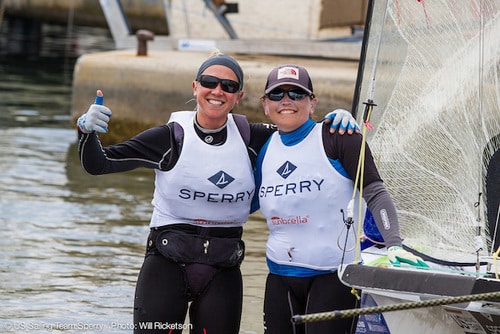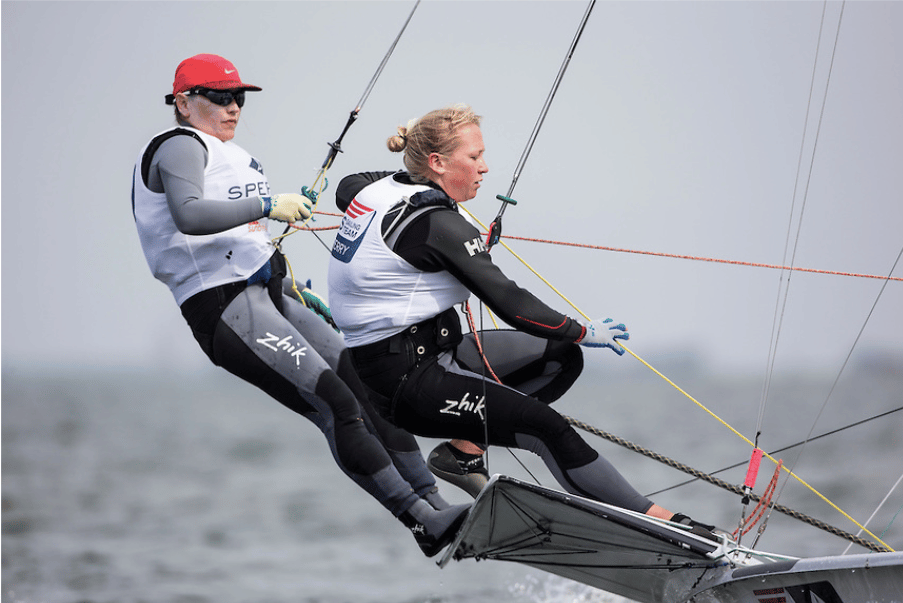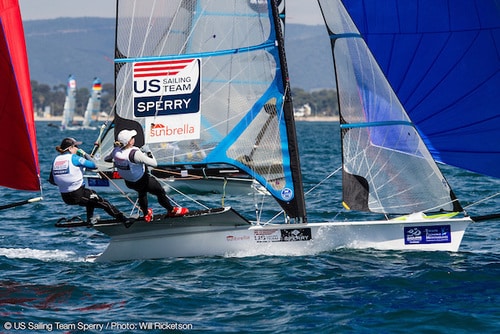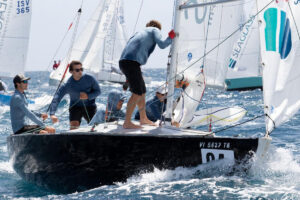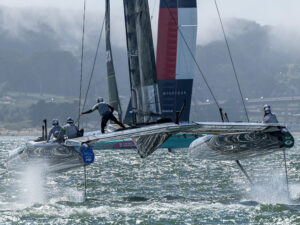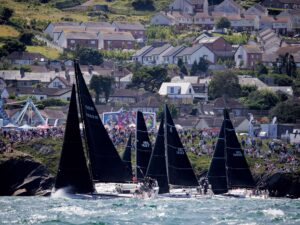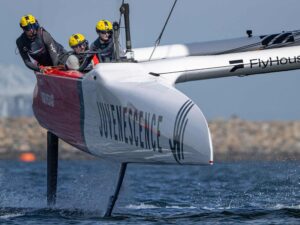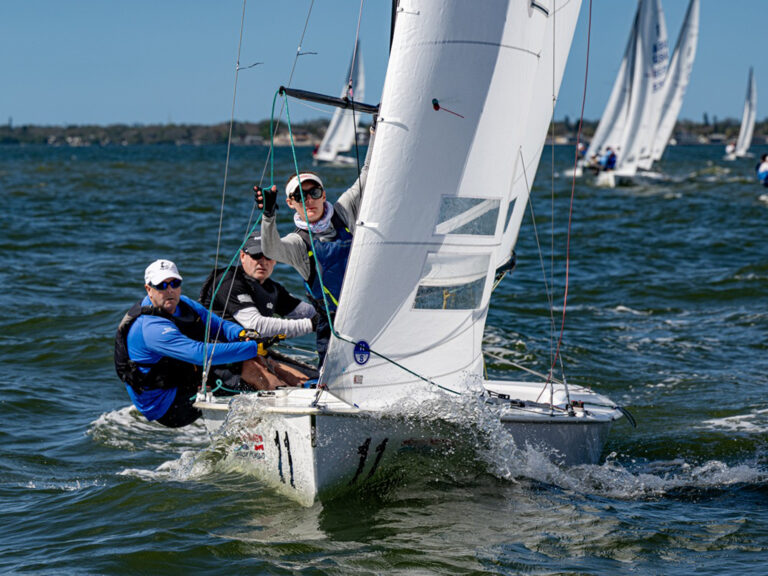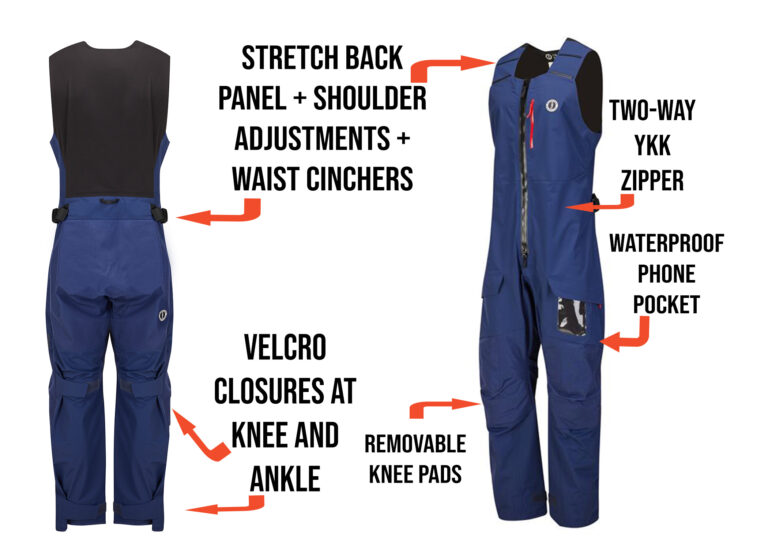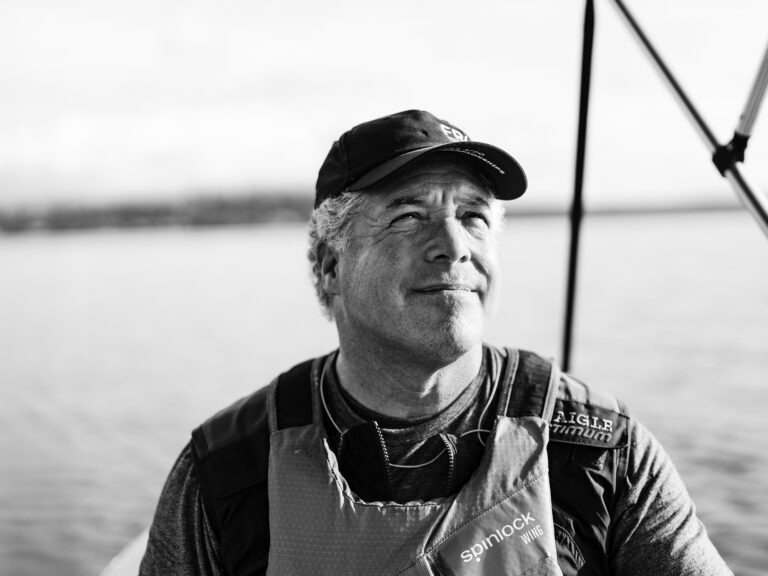If it’s not enough of a challenge to tackle a new Olympic class, Maggie Shea and Debbie Capozzi have double the challenge ahead of them: If they’re able to make it to the 2016 Olympics in Rio, they’ll have been sailing together for just two years, having partnered up nearly halfway through the quad. They’re competing against teams that have sailed together for double (or more) of that time, competed in dozens more regattas, and have more experience on the water in the new 49erFX.
But their easy banter—and their on-water results—fails to reveal growing pains in adjusting to their new dynamic on the technical boat. They finished 20th in the ISAF Sailing World Cup in Weymouth, England in June, and they’re next headed to 49erFX European Championship in Portugal in early July.
Capozzi, until the end of April 2015, was campaigning the 49erFX with former Olympian Molly Vandemoer. Vandemoer announced her retirement from Olympic campaigning in an April 11th Facebook post, thanking her former sailing partners for 12 years of successful campaigning, including Anna Tuncliffe, Allison Jolly, and Capozzi. When the announcement came, Shea stepped in.
“I’ve always looked up to Molly and learned a lot sailing against her in the past,” says Shea. “She’s an awesome competitor and I have really big shoes to fill.”
“Due to some unfortunate injuries and scheduling problems with others, the opportunity arose for Maggie and I to start sailing together,” says Capozzi. “So far, we’ve really enjoyed it; we think there’s a lot of potential. Yes, we’re a new team, but it doesn’t feel like we’re a new team. It feels like the chemistry already works. We’re really excited about it, we’re making big strides, and we’re just having fun every day.”
Of course, as is the norm in the small world of high-level competitive sailing, the two aren’t total strangers. “We actually both started sailing the 49erFX around the same time, and worked together a lot in the beginning,” says Shea. “We learned a lot of the same methodology and theories in the beginning, so it was easy for us to come together. It clicked because we’re in a similar place on our learning curve in a new class.”
Shea, who had previously spent the majority of her time focused on match racing, both as an athlete and as the Event Director at the Chicago Match Race Center, has been enjoying the change of pace that the new Olympic class brings. “It’s really technical, but it’s fun for us to get in a new boat and start at square one,” says Shea. “It’s such a high performance boat that it’s really challenging and rewarding. Things happen faster, but it’s easier to adjust to. The basics still apply. Once you adjust your tactics a little bit, its all the same game.”
Adds Capozzi, “The adjustment to a high performance boat, with an asymmetrical spinnaker, is a challenge. Once you can get past the boat handling and the sailing of a faster boat, its just fleet racing. Sailboat racing is still sailboat racing. You still need to tack on the shifts, you still need to get a good start, sail in clean air. There’s not much different, it’s just a different style of boat instead.”
The duo are well-balanced: Capozzi has the experience, having been to two Olympics (2008 on the Yngling and 2012 on the Elliot 6m), and Shea is fresh and energetic in a highly physical boat.
“Maggie keeps the energy going, especially during a race,” says Capozzi. “Her job as crew is 20 times harder than my job is, but at the end of the day she could probably still beat me going for a run. It’s a really cool balance that we have going.”
Shea echoes her partner’s sentiments: “In the short period of time I’ve been racing with Debbie I’ve learned a lot from her. Her experience shines and teaches me how to keep getting better and pushing every single day. My campaign has been shorter and not at the level that Debbie has reached in the past, so I’ve been able to learn a lot from her in that respect, which is awesome.”
Capozzi has the advantage of hindsight, with two top-ten finishes in her Olympic career. “The two Quads that I experienced, if you show up with the experience and sailing skill in place to be in the top ten, then it’s just about performing during that specific regatta and having a little bit of luck going your way, and you’re set. In the past, I’ve seen top teams that were expected to do well not perform, and others who capitalized on that opportunity.”
In a brand new class, it could be anyone’s game by the time Rio rolls around next summer. “There’s been so much development in this fleet,” says Shea. “In the first few regattas, the same people were winning race after race. Now, the average score of the top boats is much higher. The people who were really good in the first two years are now being caught. Our learning curve is so steep right now. We’ve made so much progress in the last two months that thinking about eight months from now is exciting. We’re just going to keep getting faster.”
